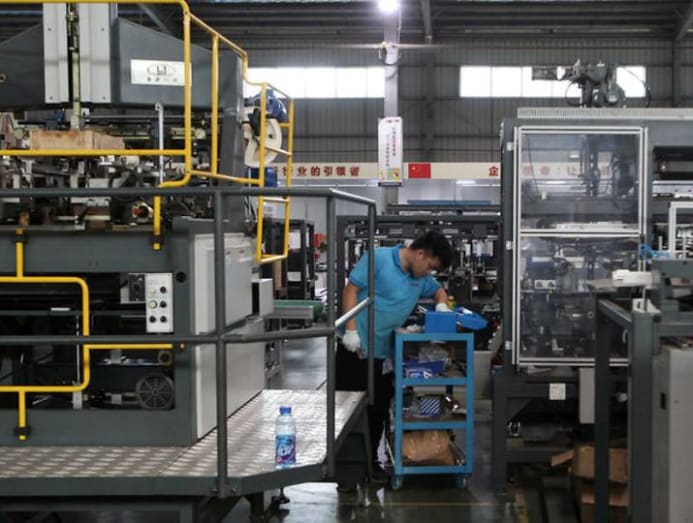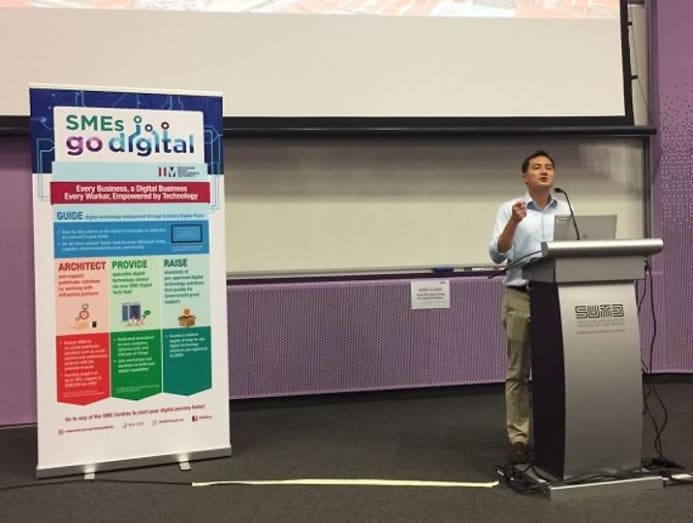Commentary: Why aren’t more Singapore businesses transforming? Mindsets aren’t the key obstacle
Advertizement
Commentary
Commentary: Why aren't more Singapore businesses transforming? Mindsets aren't the fundamental obstruction
SBF CEO Ho Meng Kit says digital transformation today really boils downwardly to two things - talent and understanding technology.

Workers in Raffles Place, Singapore. (Photograph: AFP)
17 Dec 2022 06:18AM (Updated: 09 Feb 2022 09:05PM)
SINGAPORE: By at present, most, if not all, companies in Singapore would agree digital transformation is no longer an option.
Integrating digital technology into aspects of a businesses to fundamentally change how they operate and deliver value to their customers is what's needed to survive and thrive.
Every bit early as 2010, the Government has been urging companies in Singapore, including small- and medium-sized enterprises (SMEs), to transform their businesses in order to stay relevant and competitive.
Numerous initiatives like the now defunct Productivity and Innovation Credit scheme, Technology Adoption Program and SMEs Go Digital Plan, which provides incentives and resource for SMEs to invest in automation, robotics and other technology solutions, have also been rolled out over the years.
Near x years on, the message has come through loud and clear, with companies, both big and small, responding to the call.
READ: Worst may exist over for Singapore economy but recovery will be sluggish, say experts
A SHIFT IN MINDSET IS UNDERWAY
SBF'southward annual National Concern Survey shows that the importance of business concern transformation has gained considerable ground amidst companies.
In 2016, only xv per cent of Singapore SMEs surveyed strongly agreed with the demand to transform to counter slowing economic growth and technological change. Amid large companies, the bulletin resonated twice as strong simply this was still a low number.
Today, 9 in 10 recognise the importance of business organization transformation to remain relevant and competitive, as the world becomes increasingly digital.
READ: Commentary: Singapore and the dreaded R word - recession

In 2018, more than half of Singapore companies reported implementing some course of business innovation, but findings revealed that smaller companies were less likely to innovate — larger businesses reported a higher rate of implementing new technologies (40 per cent) compared to SMEs (31 per cent).
Awareness, clearly, has not quite translated into action. Why are companies sitting on the sidelines when doing nothing means taking a bigger risk?
BRIDGING THE DIGITAL TALENT GAP
Years since companies began marching to Singapore'due south digital transformation drum beat, the key challenges hindering businesses in their transformation efforts today eddy downward to talent and technology, our research reveals.
This echoes a 2022 Cisco study which shows that most companies in Asia are slow to prefer technology due to upkeep constraints, a lack of adequate talent and an unfit IT infrastructure.

The growing demand for digital skills in the workplace has resulted in a talent deficit in Singapore's tech sector, despite the Government'southward push to encourage students to pursue careers in science, technology, math and engineering.
Need for engineering jobs in Singapore rose by twenty per cent the past twelvemonth, according to a 2022 bacon benchmark study past recruiting firm Michael Page.
For businesses, especially SMEs, this tech talent crunch presents a huge problem. Coupled with a tight foreign quota, the high demand across sectors has driven up wages and salary expectations.
READ: Commentary: The future is tech but where is Singapore's engineering science and IT talent?
This puts pressure on smaller companies who find it harder to hire talent with this correct set of skills when competing against larger, more established outfits with improve learning and evolution opportunities and benefits.
If at that place aren't plenty people to fill the gaps, companies need to explore other ways – over and above hiring – to overcome the problem.
INVESTING INTERNALLY
For 1, they need to start investing in their existing workforce and look at means to develop talent internally.
This means ensuring employee access to quality digital skills training, while as well encouraging a visitor culture of continuous learning and providing employees opportunities to take on roles that are more than valued-based and rewarding. Not simply will this help employees prepare for the jobs of tomorrow, it volition drive innovation in the visitor.

Key to success is as well anticipating digital trends and so that training remains relevant and useful not just for the jobs of today but also the jobs of the future.
In this regard, institutes of college learning and companies can wait to win-win partnerships.
READ: Commentary: In this tough job market, retraining alone is no silver bullet
Have for example, Singtel's info-communications technology solutions provider subsidiary, NCS, which has joined hands with the National University of Singapore's Institute of Systems Scientific discipline to train more than 1,000 digital ICT employees and new hires over the adjacent 2 years.
Apart from providing technical preparation for mid-career NCS employees and training for new software engineers, the collaboration allows NCS'southward subject matter experts to teach in the institute, while NCS offers internship and project opportunities to its students.

Trade Associations and Chambers (TACs) and industry leaders tin also play a leading function. Specific to industry needs, they can reap benefits of scale to set digital academies which can effectively support the digital upskilling of SME owners and their employees.
Concluding week, SBF appear a partnership with V3 Fintech, the digital financial services unit of V3 Grouping, to found Beyond Lab, a regional academy focused on supporting SMEs in adopting digital applied science to increment operational efficiency and competitiveness.
Through the university, nosotros hope to help our SMEs transform, and equip them to tap the opportunities of the digital economic system in the region.
From digital leadership development courses to cybersecurity, information analytics and artificial intelligence, these digital academies tin can help smaller companies cultivate a digital civilisation and develop the total suite of digital capabilities they demand affordably.
READ: From ice cream to chatbots – how TACs are driving transformation in Singapore, a commentary
This likewise gives them the flexibility to rent for potential, not just credentials. Instead of competing for people with the right skills, they can, instead, bring onboard people who tin can develop the skills they demand.
TACKLING THE TECH GAP
The lack of adequate talent aside, the other major challenge companies cite in our enquiry is the cost of adopting digital solutions. Some of these companies also lack a comprehensive strategy and are unsure of which solution to adopt, and where or how to deploy information technology to their all-time advantage.
One of the biggest misconceptions amidst companies, perhaps, is that digital adoption is expensive and something just big companies tin beget.

But companies can start pocket-size. Information technology could be as elementary as getting on social media or setting up a website, which can spark more than experiments with digital technology as these firms grow in experience, competence and conviction.
For a start, SMEs can leverage the Infocomm Media and Evolution Dominance's (IMDA) SMEs Become Digital Programme.
The plan offers a self-cess tool likewise as a Start Digital pack where SMEs can adopt any two solutions ranging from accounting and digital marketing to cybersecurity and digital transactions at a lower cost.
The SME Portal's Tech Depot also has a wide range of readily adoptable engineering solutions. Companies can also tap on other schemes such every bit the Enterprise Development Grant and the Productivity Solutions Grant for more complex projects which may crave significant investment upfront.
Aid IS AT HAND
To accost some of these issues, the SBF Digitalisation Committee, led by Janet Ang, SBF Council Member and erstwhile Vice President of Industry Solutions and Business Development at IBM Asia Pacific, ramped upwards its efforts this year to evidence companies what they tin readily do to embark on their digitalisation journeys.

These include industry-specific forums and the SBF-SMEs Go Digital "Leaders for Transformation" Serial which shed calorie-free on the strategies detailed in the Industry Transformation Maps, and the Manufacture Digital Plans and showcased businesses who have successfully digitalised.
SBF is as well partnering the NUS Establish of Systems Science to offer a suite of Digital Transformation programmes to upskill companies and their workforce.
READ: Commentary: Why aren't there more Singaporean CEOs?
Quondam General Electric CEO Jack Welch once said: "If the rate of modify on the outside exceeds the rate of change on the within, the end is near."
Now that businesses realise they demand to align themselves with how the world has change, they take a option to brand – atomic number 82 the pack, match the pace of alter or fall behind. Doing nothing is no longer an selection.
Ho Meng Kit is CEO at Singapore Concern Federation.
Source: https://cnalifestyle.channelnewsasia.com/commentary/commentary-why-arent-more-singapore-businesses-transforming-mindsets-arent-key-obstacle-295096
0 Response to "Commentary: Why aren’t more Singapore businesses transforming? Mindsets aren’t the key obstacle"
Postar um comentário